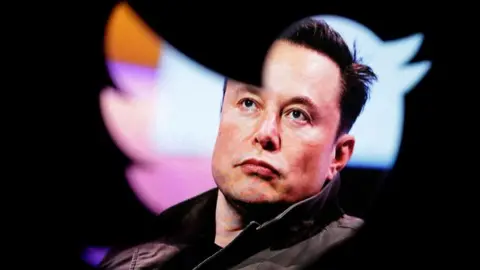Twitter temporarily restricts tweets users can see, Elon Musk announces
 Reuters
ReutersTwitter has applied a temporary limit to the number of tweets users can read in a day, owner Elon Musk has said.
In a tweet of his own, Mr Musk said unverified accounts are now limited to reading 1,000 posts a day.
For new unverified accounts, the number is 500. Meanwhile, accounts with "verified" status are currently limited to 10,000 posts a day.
The tech billionaire initially set stricter limits, but he changed these within hours of announcing the move.
Mr Musk said the temporary limits were to address "extreme levels of data scraping and system manipulation".
He did not explain what was meant by system manipulation in this context.
"We were getting data pillaged so much that it was degrading service for normal users," Mr Musk explained on Friday, after users were presented with screens asking them to log in to view Twitter content.
The move was described as a "temporary emergency measure".
It is not totally clear what Mr Musk is referring to by data scraping, but it appears he means the scraping of large amounts of data used by artificial intelligence (AI) companies to train large language models, which power chatbots such as Open AI's ChatGPT and Google's Bard.
In simple terms, data scraping is the pulling of information from the internet. Large language models need to learn from masses of real human conversations. But the quality is vital to the success of a chatbot. Reddit and Twitter's huge trove of billions of posts are thought to be hugely important training data - and used by AI companies.
But platforms like Twitter and Reddit want to be paid for this data.
In April, Reddit's chief executive Steve Huffman told the New York Times that he was unhappy with what AI companies were doing.
"The Reddit corpus of data is really valuable," he said. "But we don't need to give all of that value to some of the largest companies in the world for free."
Twitter has already started charging users to access its application programming interface (API), which is often used by third party apps and researchers - which can include AI companies.
There are other potential reasons for the move too.
Mr Musk has been pushing people towards Twitter Blue, its paid subscription service. It's possible he is looking at a model where users will have to pay to get a full Twitter service - and access to unlimited posts.
Signalled by a blue tick, "verified" status was given for free by Twitter to high-profile accounts before Mr Musk took over as its boss. Now, most users have to pay a subscription fee from $8 (£6.30) per month to be verified, and can gain the status regardless of their profile.
According to the website Downdetector - which tracks online outages - a peak of 5,126 people reported problems accessing the platform in the UK at 16:12 BST on Saturday.
In the US, roughly 7,461 people reported glitches around the same time.
Initially, Mr Musk announced reading limits of 6,000 posts per day for verified accounts, 600 for unverified accounts, and 300 for new unverified accounts.
In another update Mr Musk said "several hundred organisations (maybe more) were scraping Twitter data extremely aggressively".
He later indicated there had been a burden on his website, saying it was "rather galling to have to bring large numbers of servers online on an emergency basis".
A server is a powerful computer that manages and stores files, providing services such as web pages for users.
Adam Leon Smith from BCS, the UK's professional body for IT, said the move was "very odd" as limiting users' scroll time would affect the company's advertising revenue.
Mr Musk bought the company last year for $44bn (£35bn) after much back and forth. He was critical of Twitter's previous management and said he did not want the platform to become an echo chamber.
Soon after taking over, he cut the workforce from just under 8,000 staff to about 1,500.
In an interview with the BBC, he said that cutting the workforce had not been easy.
Engineers were included in the layoffs and their exit raised concerns about the platform's stability.
But while Mr Musk acknowledged some glitches, he told the BBC in April that outages had not lasted very long and the site was working fine.
